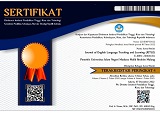Teaching Speaking and The Teacher`s Role in EFL Learning amidst Emergency Remote Teaching
Abstract
Teaching speaking in EFL learning nowadays confronts technical problems of having non face to face meeting. The condition of emergency remote teaching insists students adapting the condition of having online learning. Building the bridge of gasps, the presence of teacher`s role is significant. Confronting the problems, this study revealed teaching speaking and the teacher`s role in EFL Learning in non-English department class. The data were taken from online interview, self-written and observation then analyzed by data reduction, display and conclusion or verification. The research was taken on online class of Speech Therapy students which undergo on the online class group. The results showed that teaching speaking using video and voice note as media for teaching and learning successfully made the process occur effectively and meaningfully. The use of video stimulates students’ interest and motivation in learning the materials. Moreover, voice note be an effective media in practicing speaking, giving feedback and discussing. The result contributed to teachers and other researchers for selecting the suitable media in teaching and practicing speaking amidst the emergency remote teaching
Full Text:
PDFReferences
Atmojo, A. E. P., & Nugroho, A. (2020). EFL Classes Must Go Online! Teaching Activities and Challenges during COVID-19 Pandemic in Indonesia. Register Journal, 13(1), 49–76.
Hodges C, Moore S, et all. The Difference Between Emergency Remote Teaching and Online Learning. 2020. Accessed on 7 March 2021.
Hollweck, T. (2015). Robert K. Yin.(2014). Case Study Research Design and Methods. Canadian Journal of Program Evaluation, 30(1).
Kriswinardi, G.T, Et All. An Analysis of Using Video in Teaching Speaking in EFL Classroom of The Eleventh Grade Students of SMA N 4 Singaraja in Academic Year 2017/2018.
Lai, C., Zhu, W., & Gong, G. (2015). Understanding the quality of out‐of‐class English learning. TESOL Quarterly, 49(2), 278–308.
Mirvan, X. (2013). The Advantages Of Using Films To Enhance Student’s Reading Skills In The EFL Classroom. Journal Of Education And Practice, 4(13), 62-66.
Mustikawati, A. (2013). The Effectiveness Of Using Video In Teaching Speaking
For The Eighth Grade Students Of Smp N 1 Manisrenggo. 196.
Nugroho, A, Ilmiani & Rekha. (2020). EFL Teachers’ Challenges and Insights of Online Teaching amidst Global Pandemic. Metathesis: Journal of English Language and Teaching
Rahiem, D.H Maila. (2020). The Emergency Remote Learning Experience of University Students in Indonesia amidst the COVID-19 Crisis. International Journal of Learning, Teaching and Educational Research
Riyana, C. (2007). Video Media Development Guidelines. Jakarta: PT. Raja Grafindo Persada.
Satar, H. M., & Akcan, S. (2018). Pre-service EFL teachers’ online participation, interaction, and social presence. Language Learning & Technology, 22(1), 157–183. https//dx.doi.org/10125/44586
Yin, R. K. (2015). Qualitative research from start to finish. Guilford publications.
http://www.uopeople.edu/blog/emergency-remote-teaching-vs-online-learning/. accessed on 5 March 2021.
DOI: https://doi.org/10.18860/jetle.v2i2.11920
Refbacks
- There are currently no refbacks.
Jalan Gajayana 50 Malang 65144, Jawa Timur, Indonesia

This work is licensed under a Creative Commons Attribution-ShareAlike 4.0 International License.
Indexed by





